Perhaps you've been following my ongoing series on dark matter. Perhaps, like many, you're still skeptical. After all, it's not like we've gone and made it in a lab or discovered it in an experiment. 15 years after David Weinberg composed the Dark Matter Rap, we still don't know exactly what dark matter is.
But there's a whole lot that we do know about it just from looking out at the Universe.
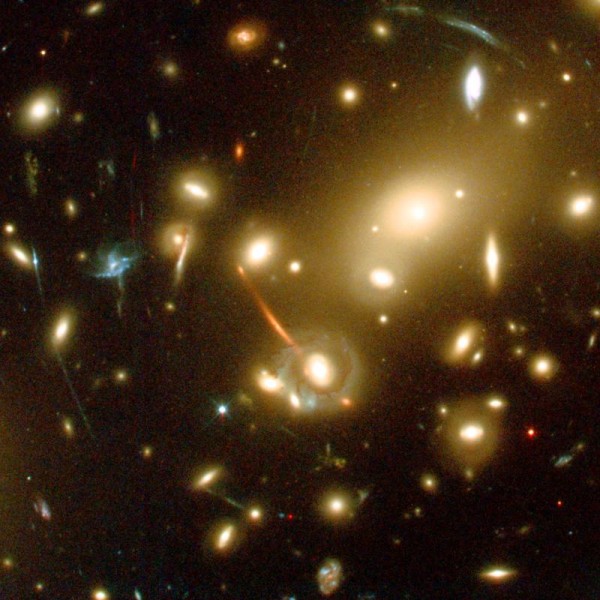
You see, there are a whole bunch of scales we can see, from galaxies to clusters to superclusters and the large-scale structure of the Universe as a whole.
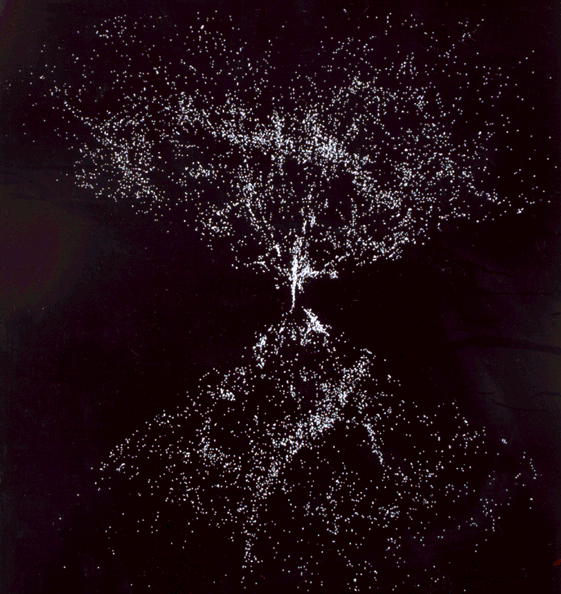
And-- since the big bang happened just under 14 billion years ago -- we can look at what these objects looked like at many different times along the way. We can see galaxies back when the Universe was a few hundred million years old, clusters when it was just 3 billion years old,
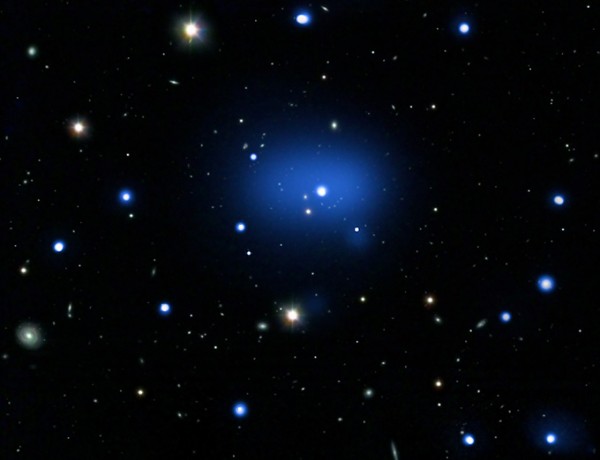
and the overall large-scale structure all the way back to when the Universe was just a few hundred thousand years old! (Thanks, WMAP!)
And what do we learn about the properties of dark matter from all of this?
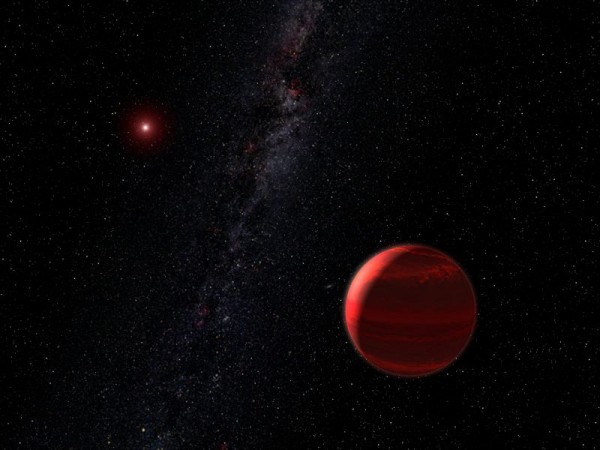
1. It isn't in dense clumps. Not faint, dark stars, not planets, not basketballs, and not gas and dust. We've already gone over that it can't be normal matter, but it also can't form structures the same way that normal matter does.
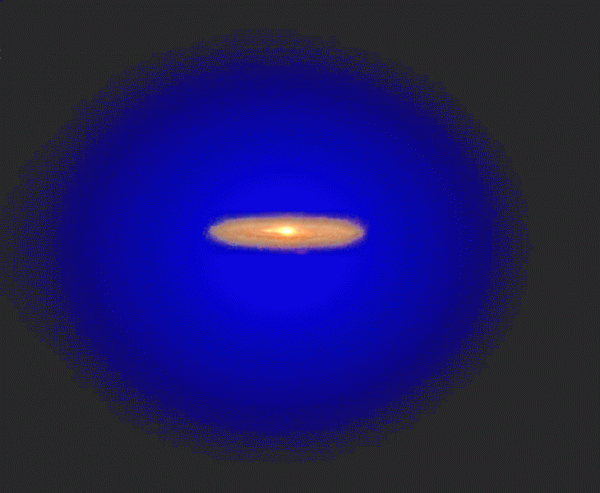
2. It doesn't interact with itself. Yes, it interacts gravitationally, but that's not what I mean. It doesn't feel the strong nuclear force, it doesn't feel the electromagnetic force, and if it feels the weak force, it feels it even more weakly than neutrinos do! (And you need about a light year of lead to stop your typical neutrino.) As a result of this, dark matter is incredibly fluffy and diffuse, which means even in our Solar System, by the heart of our galaxy, dark matter's effects are negligibly unobservable.
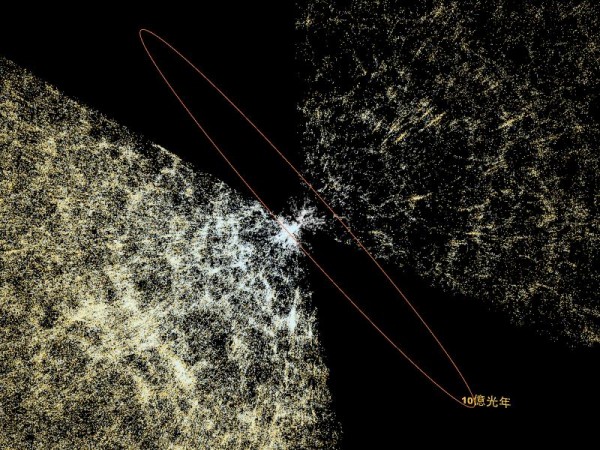
3. These dark halos form very early. This is very important. Looking back as far as we can see, we find that these diffuse collapsed structures have been around for pretty much the entire history of the Universe. This tells us that the dark matter is cold, or that its kinetic energy has pretty much always been much, much less than its mass. This rules out every single standard model particle that we know of from being dark matter, since the stable ones are relatively light and are all produced hot.

So what is it? Unfortunately, this is really all we know about dark matter. We know how much there is, we know what its gravitational effects are, we know how it doesn't interact, and we know that it's always been cold and relatively slow-moving. Can you invent something that meets these requirements? Then congratulations, you have just invented a dark matter candidate!
All of the viable candidates fall into three main categories:
 The Weakly Interacting Massive Particle (WIMP): you were once hot and produced during the big bang, but you stopped interacting with the rest of the Universe when it was very young. You cooled and collapsed, and you were heavy enough that by time we see structure, you're cold. The lower limit on how massive you are is somewhere around 100 times greater than the mass of a proton.
The Weakly Interacting Massive Particle (WIMP): you were once hot and produced during the big bang, but you stopped interacting with the rest of the Universe when it was very young. You cooled and collapsed, and you were heavy enough that by time we see structure, you're cold. The lower limit on how massive you are is somewhere around 100 times greater than the mass of a proton. The Reptile: because you were born cold. You could have a large mass or a teeny-tiny mass, or be anywhere in between. But however you were made, you were born with very little energy, and were therefore made (or at least given a mass) sometime well after the big bang. The axion is a great example of this, and I just invented the moniker "reptile", so be prepared to explain yourself to your physicist friends.
The Reptile: because you were born cold. You could have a large mass or a teeny-tiny mass, or be anywhere in between. But however you were made, you were born with very little energy, and were therefore made (or at least given a mass) sometime well after the big bang. The axion is a great example of this, and I just invented the moniker "reptile", so be prepared to explain yourself to your physicist friends. The exotic: because you're not like anything else we know in the Universe. Maybe you're a bunch of unstable particles held together by some bizarre property that renders you undetectable. Maybe you're a fundamental fluid with a miniscule amount of viscosity, the only one we've ever encountered in the Universe. And maybe you're something else entirely, but you're neither WIMP nor a reptile. That's okay, we've got a home for you. "Exotic."
The exotic: because you're not like anything else we know in the Universe. Maybe you're a bunch of unstable particles held together by some bizarre property that renders you undetectable. Maybe you're a fundamental fluid with a miniscule amount of viscosity, the only one we've ever encountered in the Universe. And maybe you're something else entirely, but you're neither WIMP nor a reptile. That's okay, we've got a home for you. "Exotic."
And that's it. There are searches going on for all three types, there are indirect tests trying to distinguish the three types, and so far, all we've learned is that dark matter isn't any of the things we would have been able to find so far.
So there's still a very, very long way to go to discover what it is. But although I may not be able to tell you that it's an elephant, I know it has tusks, a trunk, and smells terrible!
For myself, I've concluded that dark matter very, very likely exists, that these three places are the right places to be looking, and that the more astrophysical evidence we can acquire (to tell us where the dark matter is, what its gravity is doing, etc.), the better we'll know this unseen elephant.
This concludes my official series on Dark Matter, but I'm always happy to talk more about it and answer good questions!

I gotta admit, I was skeptical of dark matter before this series, and you've just about convinced me. But it still makes me uncomfortable.
Now I can't think of dark matter without imagining toucans. Which is kind of awesome.
http://img.photobucket.com/albums/v613/Hotsprings/Drawings/toucanphysic…
Sorry, it was just such a funny image, I had to make a doodle about it.
Is there any credance to the alternative that it might be a hint that gravity works slightly different than imagined by Einstein?
That is, instead of one of the particle variety, perhaps something in the lines of MOND?
By the way, I'm not an advocate of this hypothesis. I'm not even a physicist! :) Just curious...
A partly-baked idea from a non-physicist: would it make sense to resurrect the aether? Could âdark matterâ be the medium through which the forces of nature propagate? Some kind of amorphous stuff thatâs not made up of particles?
Excuse me for being dense (pun intended) but how can I reconcile "it also can't form structures the same way that normal matter does." when much of the evidence you present relates to structures? Is your point that dark matter interacts with regular matter through gravity but not with itself through gravity? If that is true why do you think a new form of matter is required rather than a re examination of what we thought we knew about gravity? After all what we know about gravity would say that mass attracts mass.
How bizarre - so its kinetic energy (given what is known) would only be attributable to motion induced by gravitational acceleration? Would that make gravitation the only means of heating and cooling the particles (since it can't absorb or emit light and it's not apparent if it can fall apart to form something which we can measure).
I don't think you can say that it only weakly interacts with itself, if you'll pardon the unintentional pun. It might be more accurate to say that dark matter can't be cooled with one of the usual mechanisms of heat dissipation: electromagnetic radiation. Surely the primordial stars and planets would have taken much longer to form if frictional heating couldn't have been radiated away.
how can I reconcile "it also can't form structures the same way that normal matter does." when much of the evidence you present relates to structures?
There are two possible answers:
1. It can form structures, but not the same kind of structures (e.g., stars and planets) as normal matter. Thus, for instance, MACHOs (Massive Compact Halo Objects) are no longer considered a viable candidate for dark matter, as they were in the 1990s when I was in grad school. But dark matter can clump in other ways, and since dark matter comprises more than 80 percent of the Universe's mass, the normal matter will follow.
2. Something else created the structures and the dark matter went along with it. What that something else is, and how you get dark matter to go along with it, I have no idea.
Does dark matter distribute around galaxies because the regular matter distribution is inhomogenous (eg, the DM is "pulled into" the galaxy's neighborhood sometime after the galaxy coalesced) or did it start out with the same inhomogeneities at the end of inflation (so that the distribution is a result of its own gravitation)? Or can't we tell? Or is that a dumb question?
Eric at #9
Point 1: My problem is that either dark matter obeys the law of gravity and therefore can form structures the same way regular matter forms structures - or at least "clumps". Or the mass of dark matter does not obey the laws of gravity in which case our understanding of gravity is incomplete. Not saying that means the answer is MOND. Just saying.
Bob, I think I see your difficulty. I suspect the answer has something to do with the fact that dark matter interacts only gravitationally, whereas normal matter can interact in other ways, particularly via the electromagnetic force. Get two atoms close enough to each other, and they are likely to form a molecule. Get a bunch of molecules together, and they can form a cohesive body which can grow to anywhere in size between a dust grain and a large planet. Electromagnetism is a much stronger force than gravity (by more than 40 orders of magnitude in the case of electron-electron interactions). This is why our lack of a quantum theory of gravity has not prevented us from understanding the quantum mechanical interactions of subatomic particles: the effects of gravity are so weak as to be dominated by the Heisenberg Uncertainty Principle. However, two bits of dark matter (whatever they may be) can only interact through their gravity. They also have no way of dissipating whatever thermal energy they do have (and it must be nonzero, as otherwise they would collapse into compact objects--they may be cold by the measure Evan gives, but they are hot compared to their much smaller gravitational binding energy).
If dark matter only interacts, with normal matter, via gravity does it intercat with itself via gravity as well?
Will dark matter be trapped in a black hole as normal matter will?
Sorry if the questions are silly, but dark matter is very confusing for this non-physicist.
On the Toucan, perhaps you should have two.
Then it would be Guinness rather than exotic (early adverts for Guinness had two Toucans) and that would be appropriate. Mostly dark with a bright froth on top :o)
Eric
Thanks I understand the relative streng of the 4 fundamental forces. Your point I think is that without clumping due to EM forces (bonds, friction etc) the force of gravity can not overcome the random thermal motion of dark matter to get the process started. Have I got it? But through the gravitational interaction with normal matter, which does form gravitationally induced structures, say a black hole, does the spatial distribution of dark matter follow the spatial distribution of ordinary matter through gravitational interactions with ordinary matter? Is there a higher density of dark matter within a black hole event horizon than outside of it?
Do even the small dwarf and irregular galaxies have dark matter halos about them? Also, I know it's a bit off topic, but would they also have central supermassive black holes? Do stars in irregular galaxies rotate around a common center of mass, or are they just generally fixed to the influence of neighboring stars?
I should stop thinking about dark matter; the implications just get weirder. For example, temperature is based on the kinetic energy of a particle so it is related to the mass and the velocity of that particle; in fact temperature as originally conceived was a bulk property (a mean kinetic energy) but we have extended the definition to the quantum level (individual atoms and molecules). We can measure temperature by at least 2 methods: conductive (which involves collisions and transfer of momentum, so is inseparable from the electrostatic interaction) and radiative (measurement of emitted light, which is necessarily tied into an electromagnetic interaction). Neither of those two broad techniques are applicable to dark matter, so how can we define a temperature - or does it even make sense to define a temperature? How are neutrino temperatures defined (and does 'temperature' make sense in the case of neutrinos).
This is all very fine, but has anybody proposed a prediction diagnostic of the presence of dark matter, and then found the prediction borne out? Or do we only sprinkle dark matter about, after the observations have been made, in such a way we can say that they are consistent with the presence of the dark matter we have sprinkled?
It ain't science until you predict a result and then go see if it happened.
One thing, can we change the name to Ghost Matter? It's a more accurate name than Dark Matter, and much cooler.
Nathan Myers, while I get what you're saying, and obviously new falsifiable predictions are ideal, remember that science came first and Popper after!
Science builds models which explain the data. As Ethan's excellent series shows, the *web* of evidence is compelling, and there really isn't any alternative at this time.
As proof it's science, there are the (science) experiments (deep underground) to try to detect dark matter.
Dark matter as a part of the cosmology model has very few details, but it's a start, and it's definitely science.
You really should read the series.
"1. It isn't in dense clumps."
"2. It doesn't interact with itself."
"3. These dark halos form very early."
With these characteristics, is it accurate to refer to 'dark matter' as 'matter'? It may be that it is something that is 'not matter' and also 'not energy'. I have no idea what it might be, just that the first two of those characteristics seem to say 'not matter'....whatever that may turn out to be.
Questions:
-If space-time itself is expanding,(For each observer a different aspect,)what would be the facts we could observe?(Different? If no expansion.) Matter vs. dark matter?
-Is gravitation a force or a consequence of an expanding space-time? (Acting on matter/dark matter)
Love this series, Thanks Ethan.
DaveH: Special Pleading. "There really isn't any alternative" is no argument at all. As such, it rather undercuts your personal credibility.
An argument that goes "look at all the coincidences", as we have in Ethan's exposition, demonstrates that a theory is worth testing, but does not count as actual support.
Ethan's explanation of dark matter is quite excellent in that it describes the most important observations. Nevertheless, we still haven't a coherent theory as to what these observations are telling us; except that they all point to "apparently missing gravitational mass" as clue.
I would suggest that there are several other important "apparent clues". The "apparent age" of the universe, the "apparent velocity" of recession of distant galaxies, the "apparent acceleration" of distant galaxies, the "apparent Euclidean flatness of our visible universe".
Ethan's explanation is the best there is and a complete explanation of the observed phenomenon called "dark matter"; if you accept the big bang theory (and all of its extraordinary assumptions) and the Euclidean flatness of the 3-dimensional space of our visible universe. Please, seriously critique page 36-39, I won't bore you here.
Net, the "dark matter" conclusion rests upon a dubious theory, albeit the best and most accepted and most popular but still a house of assumptions upon assumptions not so different than Ptolemy's epicycles.
Nathan, my personal credibility is irrelevant. However, this is mainstream cosmology, and it's not "special pleading" by me or Ethan or anyone else. Okay, if you think the experiments looking for dark matter are not science, then you just need to convince the scientists...
If mainstream cosmologists are presenting the argument you did, then they, too, are relying on special pleading (but that doesn't excuse you). The people down in the holes looking for evidence of dark matter may be doing science.
I'll stay "unexcused" :D
The people looking for evidence of dark matter are doing science :).
The people suggesting the Luminiferous Aether didn't have any real evidence for it either. But they made predictions and performed experiments. They were proven wrong, but they did things the right way. I don't see why we shouldn't accept DM the same way. It works for the time being, and it generates testable hypotheses (I hope Ethan will do another post of the searches for DM). Until disproof arrives, I'll happily take DM on it merits - it works.
Ethan,
If DM is Wimpish in nature will it then interact more strongly with itself or with ordinary matter?
Self annihalating DM?
http://www.skyandtelescope.com/news/66968132.html
For me the no go is in the statement :
"It doesn't form structures"
because it stands in contradiction with the statement :
"it interacts with normal matter and itself gravitationally"
in the case when GR holds for both normal matter and GM .
.
If the second statement is true then it is impossible not to form structures .
Unless one considers that DM interacts gravitationally in 2 modes :
Mode 1 GR is what it does to normal matter
Mode 2 unknown is what it does to itself
But then mode 2 is necessarily different from GR (because DM doesn't do structures) and we are back to having to modify GR anyway .
I am not sure that DM exists but even if it exists , GR has to be modified anyway .
From the evidence, the dark matter did form large structures at one point, during galaxy and cluster formation. Can we predict at which point during expansion of the universe these structures are going to coalescence? Basically when a cluster has become isolated, it's regular mass collapsed into some dense core form, will the dark matter follow that collapse or will it maintain that halo shape forever?
Sorry, but all this talk of maybe, somehow, indirect, yada yada reminds me of nothing so much as the quest for the Yeti based upon some footprints and bad video.
Dark Matter/Dark Energy is little more than an admission that the experimental data doesn't fit known theories. And DM/DE does not satisfy.
Get some direct detection! Claiming that DM/DE is weakly interacting just sounds like a bunch of lame excuses for a theory that isn't holding water 2-odd decades after first being proposed. Sometimes you've got to concede that current thinking and proposals are broken and it's time to try something else. Otherwise all you've got is an imaginary Yeti on your hands.
Could dark MATTER be heat given off by everything, after all heat escapes to space at least thet is what we are told.
I believe that the heat give off by everything burning so hot so heavey is somehow interacting with the matter of the universe to cause it to push away from everything and if epsilon euals delta (lol) then epsilon or delta needs more info to be true unless under controlled circumstances of which this universe is not.
After all isnt expansion a quality of heating up matter?
Do you want to tell me things are cooling down now?
I dont think it matters (matter lol) how much things cool down if the fire is still burning in most of the universe jeesh couldnt gamma rays create heat one elements duh! just watch your candles the wax gets away from the heat but helps in its creation without total destructio. the heat muse be a variable somewhat different from energy if not involved with it but must be different because its supposed to cool in space that makes it a curve of some sort it dont go instanly to 0 it has some effect on expansion if not a big one in the neighborhood think of the effect over millions of years of burning suns fusion and such things. dark matter exists but it must be something we see everyday and dont realize it otherwise your into bs quantum theory just bs theory not the ones that might make sense in the future. believe it or not we live in this time this space this movement it doesnt change when you wake up in the morning.
no matter what happens matter will adapt itself to whats happening around it
WE NOW KNOW WHAT DARK MATTER IS!!
(3 years later).
Citation needed there, old bean.